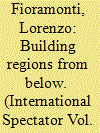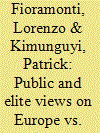| Srl | Item |
| 1 |
ID:
111552


|
|
|
|
|
| Publication |
2012.
|
| Summary/Abstract |
In a changing world ridden with crises and characterised by a general redistribution of power, regional organisations need to reinvent themselves. Equally, the study of regionalism has to reject its traditional Eurocentrism to embrace new conceptual categories in order to describe more effectively the variety of regional processes across the world. Against this background, this article looks at the European project and its current crisis before discussing other regional 'experiments' in Africa, Asia and Latin America, which rest on different principles but also manifest considerable shortcomings. The analysis points to the need to look at regionalism with a critical eye, emphasizing the undeniably important achievements but also the hidden threats that a certain model of regional integration (for instance, the classical top-down elite-driven process adopted by the EU founding fathers) can pose to the sustainability of regional cohesion and the adaptability of this model to other areas of the world.
|
|
|
|
|
|
|
|
|
|
|
|
|
|
|
|
| 2 |
ID:
081219


|
|
|
|
|
| Publication |
2008.
|
| Summary/Abstract |
The European Union portrays itself as a different global actor. This self-representation has triggered a debate around the EU as a global 'normative power', while providing momentum for innovative research into how other societies view and assess the global performance of the EU. For the first time this article presents the findings of a study conducted respectively in Brazil, India and South Africa. As leading nations of the 'global South', these three countries offer important insights into how the EU is perceived not only in emerging markets, but also in the so-called developing world at large. The findings reveal that the EU is an unknown entity to most citizens in these countries and is rarely covered by local media. Moreover, it is often criticised for inconsistencies and double standards by political elites and civil society, especially in the area of international trade, while being praised as a successful example of regional integration.
|
|
|
|
|
|
|
|
|
|
|
|
|
|
|
|
| 3 |
ID:
104297


|
|
|
|
|
| Publication |
2011.
|
| Summary/Abstract |
Europe has been the privileged economic and political partner of Africa, but more recently China has increased its foothold in Africa through important financial investments and trade agreements. Against this backdrop, the empirical research conducted in 2007-08 in Kenya and South Africa as part of a pioneering international project investigates the perceptions of public opinion, political leaders, civil society activists and media operators. While confirming their continent's traditional proximity to Europe, African citizens are increasingly interested in China and its impact on Africa's development. Europe is criticised for not having been able to dismiss the traditionally 'patronising' attitude towards Africa. While African civil society leaders and media operators describe China as an opportunity for Africa to break free of its historical dependence on European markets, other opinion leaders warn against too much enthusiasm for the Asian giant. There is a suspicion that the Chinese strategy might, in the long run, turn into a new form of economic patronage.
|
|
|
|
|
|
|
|
|
|
|
|
|
|
|
|